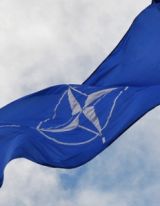The Atlantic Council’s Energy and Environment Program and the Brent Scowcroft Center on International Security hosted Colonel Romualdas Petkevicius, director of NATO’s Energy Security Center of Excellence (ENSEC COE) in Lithuania, for a discussion moderated by on the functions and structure of the ENSEC COE and how the Center fits into broader NATO policies concerning energy security. Roundtable participants discussed ways for ENSEC COE to develop, remain relevant, and advance energy security priorities in NATO member countries and beyond.
| Featuring Romualdas Petkevičius, Director, NATO Energy Security Centre of Excellence (ENSEC COE) Opening remarks by Moderated by |
As discussed, currently in NATO there is no agreement on the definition of energy security as it differs based on each country’s needs; however, there is a paragraph in the NATO concept from 2010 that states the importance of energy security, and in 2012 there was further agreement that NATO wants to be involved in energy security and energy efficiency of military forces. The Energy Security Center of Excellence (ENSEC COE) was initially created by a few nations, including the United States, for the purpose of providing NATO with expertise and support on such energy security issues. In addition to providing expertise on energy security, the ENSEC COE provides training and education in energy security development courses for military leaders and hosts military exercises.
The ENSEC COE’s initial agenda when established in 2011 was to deal with high political issues and policy, but Col. Petkevicius posited that due to NATO’s unwillingness to talk about energy security as a policy issue, their agenda is now directed towards operational energy security. Due to this ambiguity regarding their agenda, the ENSEC COE is looking for a place in NATO where it can be of value, for example in strategic risk assessment. NATO conducts intelligence assessments that discuss the potential disruptions to the energy system. However, in discussions of energy security NATO fails to connect it to market analysis, and Col. Petkevicius believes this is a critical next step.
Cooperation between NATO and the EU is based primarily in other COE’s, but the ENSEC COE is also reaching out not only to the EU but also to global partners. As some example, the ENSEC COE is working with the EU’s “Go Green” initiative and engages in information sharing and infrastructure protection training with Azerbaijan. Since Lithuania currently holds the EU presidency, and the ENSEC COE is based in Lithuania, energy security is one goal they hope to bring to the forefront of the discussion. They also hope to bring a renewed focus on climate change preparation and disaster relief. For the NATO 2014 Summit, Col. Petkevicius expects vigorous discussion of their green agenda, including energy efficiency and security, and that this discussion will most likely be connected with enhanced military capabilities.

